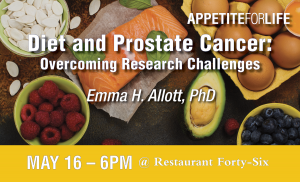 Appetite For Life – Monday, January 22, 2018, with Carol Cheatham, PhD, Associate Professor of Psychology and Neuroscience: “Why do we eat applesauce with pork?”
Appetite For Life – Monday, January 22, 2018, with Carol Cheatham, PhD, Associate Professor of Psychology and Neuroscience: “Why do we eat applesauce with pork?”
Many explanations can be found as to why certain foods are always eaten together; some actually make sense. How about whole foods? Why are certain nutrients always found together in whole foods? Dr. Cheatham will present the available evidence surrounding the superiority of eating whole foods to support brain development and function. After a discussion of ancient and current food practices, she will dig deeper into the idea that nutrients appear together in nature because they support each other in their functional properties. As an example, she will present some of her work showing that nutrients in human milk work together in support of infant recognition memory. Come learn about your food and how you can best use it to fuel your brain! View PowerPoint presentation. View video.
 Appetite For Life – Monday, February 12, 2018, with Jef French, PhD, Visiting Professor of Nutrition: “The Effects of Genes and Environment on Our Health”
Appetite For Life – Monday, February 12, 2018, with Jef French, PhD, Visiting Professor of Nutrition: “The Effects of Genes and Environment on Our Health”
Our individual genetic differences and the environments we live and work in can interact in a number of ways to affect our susceptibility or resistance to some diseases, but not to others. Over- or under-nutrition, as well as to exposures to toxic agents at work or at home, can also affect our health and quality of life. In addition, there are particular times in our aging and development when we are more susceptible than others. We will review and consider the latest information on new genetic tools that help inform us of our history, our ancestors’ history, and our individual differences in why some of us, but not others, may be more resistant or susceptible to gene-by-environment interactions that affect our health. A major effort at the NRI focuses on Precision Nutrition, which requires identifying individual genetic differences and how our diet or specific nutrients can modify our health. The new research tools we are developing and testing may aid human research and development of new treatment. View PowerPoint presentation. View Video.
 Appetite For Life – Wednesday, March 14, 2018, with Susan Sumner, PhD, Professor of Nutrition, UNC Nutrition Research Institute: “Using Biochemical Fingerprints to Understand Individual Health and Response”
Appetite For Life – Wednesday, March 14, 2018, with Susan Sumner, PhD, Professor of Nutrition, UNC Nutrition Research Institute: “Using Biochemical Fingerprints to Understand Individual Health and Response”
Metabolomics involves the study of the low molecular weight complement of cells, tissues, and biological fluids. Metabolomics makes it feasible to profile the biochemistry of an individual or system – providing a biochemical fingerprint. This approach is being used in studies to assess the pattern of changes (and related metabolites) arising during different periods of health and wellness and can be used to develop strategies for nutritional intervention. During this program, Dr. Sumner will provide an overview of studies in which metabolomics has been used to gain biological insights into pregnancy complications, autism, immune responses, and environmentally relevant exposures. View PowerPoint presentation. View video.
 Appetite For Life – April 18, 2018, at Johnson & Wales University: “Putting the Spring in Your Spring Chicken”
Appetite For Life – April 18, 2018, at Johnson & Wales University: “Putting the Spring in Your Spring Chicken”
In collaboration with Johnson & Wales University, the UNC Nutrition Research Institute is pleased to present a cooking demonstration and nutrition talk at the JWU campus in Center City Charlotte. Chef Megan Lambert from Johnson & Wales and registered dietitian Steph Saullo, RD from the NRI will come together to present “Putting the Spring in Your Spring Chicken,” demonstrating delicious, healthy springtime meals while sharing tips for consuming a balanced, nutritious diet. Guests will be able to sample the fare. Space is limited. Register early for this much-anticipated event! View video. View Recipes. View Nutrition Notes.
 Appetite For Life – Wednesday, May 16, with Emma Allott, PhD, Visiting Research Assistant Professor of Nutrition, UNC Nutrition Research Institute: “Diet and Prostate Cancer: Overcoming Research Challenges”
Appetite For Life – Wednesday, May 16, with Emma Allott, PhD, Visiting Research Assistant Professor of Nutrition, UNC Nutrition Research Institute: “Diet and Prostate Cancer: Overcoming Research Challenges”
Prostate cancer is the most commonly diagnosed cancer in US men, and the second leading cause of male cancer deaths. The World Cancer Research Fund recently highlighted the striking lack of dietary and lifestyle risk factors for this disease, despite ongoing research efforts. This talk will focus on two main reasons for our lack of progress. The first is that prostate cancer, like many other tumor types, is a biologically and clinically heterogeneous disease. Therefore, until we can accurately classify biologically distinct subgroups of prostate cancer, we will be unable to identify the risk factors for these different types of the disease. Secondly, individuals may respond differently to dietary factors, based on their unique genetic make-up. As such, it may be necessary to incorporate genetic data into studies examining the link between diet and prostate cancer. With improvements in technology now making it possible to overcome these research challenges, this talk will outline the progress we are making in identifying modifiable risk factors which will guide prevention efforts. View PowerPoint presentation. View video.
 Appetite For Life – Wednesday, September 19, with Delisha Stewart, PhD, Assistant Professor of Nutrition, UNC NRI: “Race, Ethnicity, and Health Disparities”
Appetite For Life – Wednesday, September 19, with Delisha Stewart, PhD, Assistant Professor of Nutrition, UNC NRI: “Race, Ethnicity, and Health Disparities”
Scientists at the Nutrition Research Institute are studying the role of genetics in health and wellness. Epidemiology studies have shown that some groups of people are more likely to develop disease, and clinical studies have demonstrated that some individuals are more likely to have a positive response to treatment, or interventions compared to other individuals. A goal of our research is to understand what makes some individuals susceptible to disease, and how we can improve intervention and treatments for more positive outcomes. During this program, you will learn about differences in disease risks that are related to race and ethnicity, factors that are known to contribute to diversity in disease risks, modifiable behaviors that reduce the risks of developing disease, nutritional interventions that have been shown to diminish disease risks, and nutritional interventions that have the potential to improve health outcomes. View PowerPoint presentation. View video.
 Appetite For Life – Wednesday, October 17, 2018 at Johnson & Wales University-Charlotte: “Fun(ctional) Fall Flavors”
Appetite For Life – Wednesday, October 17, 2018 at Johnson & Wales University-Charlotte: “Fun(ctional) Fall Flavors”
In collaboration with Johnson & Wales University, we are pleased to present a very special event at the JWU campus in Center City Charlotte. Chef Megan Lambert, MS, RD, from Johnson & Wales and registered dietitian Steph Saullo, MS, RD from the NRI will come together to demonstrate delicious, healthy cooking while sharing tips for consuming a balanced, nutritious diet. Attendees will be able to sample the fare following the presentation. The location of the event is Hance Auditorium, Johnson & Wales University. View recipes. View nutrition notes. View Video.
 Appetite For Life – Wednesday, November 14, 2018 with Sandra Mooney, PhD, Associate Professor of Nutrition at UNC NRI: “Can Nutrition Improve Cognition?”
Appetite For Life – Wednesday, November 14, 2018 with Sandra Mooney, PhD, Associate Professor of Nutrition at UNC NRI: “Can Nutrition Improve Cognition?”
The developing brain is very sensitive to environmental influences. These can be positive, such as exercise or good nutrition, or negative, such as too much stress or exposure to some drugs. Most people are exposed to a combination of positive and negative environmental factors and are perfectly normal, but when the bad outweigh the good, normal brain development can be altered and this may be seen in the form of abnormal behavior. Dr Mooney will talk about some of the brain and behavior changes seen in the lab after exposure to alcohol, and some of her work looking at nutritional interventions that appear to improve these. View PowerPoint presentation. View video.
